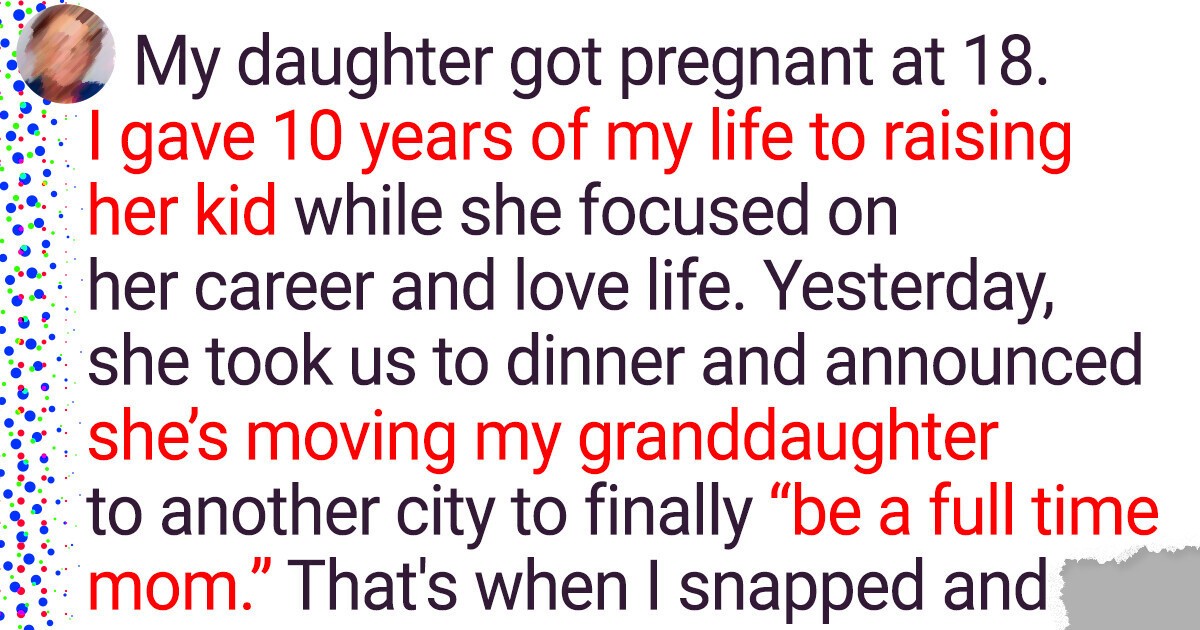12 People Who Can’t Forget the Staggering Things Their Partners Once Said


Raising a child is never easy, but what happens when you’re raising your grandchild because the parent is off pursuing their own dreams? That’s the heartfelt story of one of our readers, a 58-year-old grandmother who has spent the past decade as the primary caregiver for her granddaughter, Lily. Now, after a divorce and a major lifestyle shift, the mother wants to step back into the role of full-time parent. Let’s delve into this compelling story and unpack the challenges of navigating this deeply emotional and relatable family dilemma.
Here’s how this heartbreaking letter began, “My daughter got pregnant at 18. I gave 10 years of my life to raising her kid while she focused on her career and love life. Yesterday, she thanked me for stepping in, and casually announced she’s moving my granddaughter to another city to ‘finally be a full-time mom’. Taking away my Lily, without even asking me.”
“But maybe I should give some details so you can understand my situation and give me advice.
I felt guilty that my daughter, Claire, got pregnant and had a baby at 18. At the time, it was like I had somehow failed her as a parent — maybe I was too soft on her or spoiled her too much. So I wanted to support her as much as I could.
Claire is 28 now. So I raised her child as my own for the past 10 years while she focused on her life, career, and dating. Lily, my granddaughter, is a bright, confident, and thriving kid.
At first, I thought it was temporary — late-night feedings, diaper changes, and doctor’s appointments while Claire found her footing. But as time went on, Claire became less involved in Lily’s day-to-day life. She started spending less time at home, and eventually, Lily was living with me full-time, with Claire visiting on weekends when her schedule allowed. I never resented it; I wanted to give Claire the space to succeed, and most importantly, I wanted to make sure Lily had a stable, loving home.”
“When Lily was 3 years old, Claire got married. I truly thought that would be the moment she’d finally take Lily to live with her and give her a real family. But I was stunned when, after getting married, she said her daughter would ’interfere’ with her new family and that her husband didn’t want kids — at least, not for now.
Over the years, it became clear that Claire saw herself more as a ’cool aunt’ than a mom. Even after marrying, she only stepped in on weekends when her husband wasn’t around. Sure, she’d attend the occasional school event or buy Lily an expensive gift here and there, but the deep, maternal bond just wasn’t there. I became Lily’s everything — her caretaker, her rock, her real mom in every way that mattered.”
“After her divorce, Claire made some big changes. She bought a house, switched to a 9-to-5 job, and started spending more time with Lily—picking her up from school and spending weekends together. While I genuinely appreciate her efforts to take on a more active role as a mother, this sudden shift has left my poor granddaughter feeling stressed and unsettled. We’ve built a stable, comfortable routine over the years, and this abrupt change has completely upended her sense of security.
Last week, Claire invited the whole family over for dinner at my house—her sisters, their husbands, and all the kids. I assumed it would just be a casual, cozy evening with everyone catching up. But apparently, Claire had a bigger agenda in mind.
Midway through the meal, she stood up and, with a proud smile, announced, ‘I want to thank my mom for all the amazing support she’s given me over the past ten years. Without her help raising Lily, I wouldn’t have been able to accomplish everything I have. But now, with nothing holding me back, I’m ready to step up and be a full-time mom.’
The room fell silent as everyone processed her words. Then came the real bombshell: Claire announced that Lily would be moving in with her next week, once her new room was ready, and that she’d also be transferring Lily to a ‘better’ school closer to her house.
I was stunned. It wasn’t just the suddenness of it all—it was how casually she dropped the news as if it wouldn’t completely turn Lily’s world upside down.”
“But there was just one problem: neither Lily nor I were consulted about this plan. At that moment, I couldn’t hold back any longer. I stood up, calmly thanked my daughter for her kind words, and said, ’Of course, you can take Lily — but only on one condition: you need to ask her first. Uprooting a 10-year-old girl from the only home she’s ever known—her friends, her school, and the routine she’s thrived in — would be damaging if it’s not what she wants.’
Claire brushed me off, insisting that she’s the mother and knows what’s best. But the truth is, she doesn’t. Claire doesn’t know Lily the way I do. She’s never been there for the hard days or the milestones, and Lily has made it clear that she doesn’t want to move in with her mom.
Now, Claire is furious, accusing me of turning Lily against her and undermining her authority as a mother. My other daughters are trying to play peacemaker, saying I was right but could’ve handled it more delicately. And I’m left wondering — am I wrong for standing my ground? Should I just step back and let Laura take over, even if it’s not what’s best for Lily?”
“For context, there’s no formal custody arrangement between us. Everything has been informal, entirely based on Claire’s convenience. I raised her child for 10 years while she focused on her life, career, and dating. She’s never paid child support, and I can confidently say that I’ve covered about half the cost of raising Lily on my own. It’s always been on Claire’s terms, whenever it suited her schedule.
But now divorced, she wants full custody, claiming she’s ready to be a full-time mom. And when I set one condition — to ensure her child doesn’t suffer from such a drastic change — she blows up. I’ve tried to encourage their relationship over the years, but the effort has always been one-sided. I’ve never spoken poorly of Claire to Lily, but she’s old enough now to see the truth for herself.
I love my daughter, but I also know that Lily deserves stability and a voice in decisions about her own life. I’m at a loss for how to handle this without further fracturing our family. What would you do in my shoes?”
Thank you for sharing your heartfelt story. Your love and sacrifice have shaped Lily’s life in profound ways. Your unique perspective as a grandparent raising a grandchild highlights both the joys and the challenges of grandparent caregivers. While this family drama is an emotional rollercoaster, your dedication to Lily’s well-being and stability shines through.
Let’s address your personal story in the context of the broader family conflict and unpack some of the life lessons it offers to others navigating similar situations.
When a parent neglects their childcare duties, grandparents often step in to fill the gap, becoming grandparents as primary caregivers.
Your story is a relatable experience for many who take on this responsibility out of love and commitment to family values. While Claire’s neglect was unintentional at first, it evolved into a pattern that left you to shoulder the emotional and financial burden of raising Lily.
Addressing neglect without causing further family conflict is challenging. You’ve wisely avoided criticizing Claire in front of Lily, but it’s equally important to have honest, private conversations with her about the impact of her choices. Acknowledge her recent efforts, but also advocate for Lily’s stability as the top priority.
Studies show that in the UK, around 63% of grandparents regularly provide childcare for their grandchildren under 16 years old. But it comes with unique challenges and rewards.
Grandparents raising grandchildren face unique challenges. While children benefit from the wisdom, patience, and stability grandparents often provide, the role of the primary caregiver can lead to physical exhaustion and strained family relationships. Your heartfelt story demonstrates how rewarding yet complex this arrangement can be.
For Lily, you’ve been more than a caregiver — you’ve been her constant source of love and stability. Grandparents as primary caregivers must tread carefully when decisions about their grandchildren’s future are made, particularly when parents like Claire wish to reclaim their role. The life lessons you’ve imparted to Lily are invaluable, and any changes to her living situation should preserve the stability she has known.
The answer is yes, but it requires clear boundaries and strong communication. Grandparents often act as co-parents when the primary parent is unable or unwilling to fully commit, as in your case.
However, the lack of formal arrangements in your family has made the situation more difficult to navigate.
To avoid further emotional rollercoasters, consider developing a shared parenting plan. While it doesn’t have to be legally binding, it should define roles, responsibilities, and expectations to ensure everyone is on the same page. This step could help prevent misunderstandings while protecting Lily’s needs.
Your family drama has understandably created tension between you and Claire. Resolving this family conflict requires empathy and collaboration. Here are some steps to consider:
Setting boundaries in family relationships is challenging but essential. Here’s how to approach it effectively:
Addressing poor parenting choices requires both honesty and tact. Instead of focusing on Claire’s past mistakes, redirect the conversation to Lily’s present and future.
For example, instead of saying, “You weren’t there for her,” you can try, “Lily has thrived in her routine, and I want to ensure any changes continue to support her growth and happiness.”
Your personal story illustrates how grandparents as primary caregivers often face the difficult task of addressing sensitive issues without fracturing family relationships. It’s a delicate balance, but your love and sacrifice show you’re more than capable.
Your heartfelt story is a relatable experience for many grandparents raising grandchildren. You’ve navigated the challenges of grandparent caregivers with grace, providing Lily with a stable, nurturing environment. While Claire’s desire to step into her role as a mother is commendable, the process must prioritize Lily’s well-being.
Here’s what Bright Side recommends:
Your unique perspective and dedication to family values will guide you through this emotional rollercoaster. Keep advocating for Lily with the same love and sacrifice you’ve shown over the years. With careful planning and open communication, you can find a resolution that works for everyone.
Here’s another story of family conflict: I Secretly Fed My Vegan Sister’s Kids Meat — She Banned Me From All Family Events.











